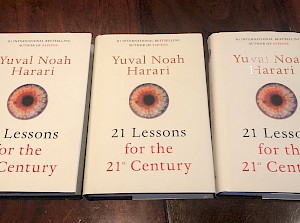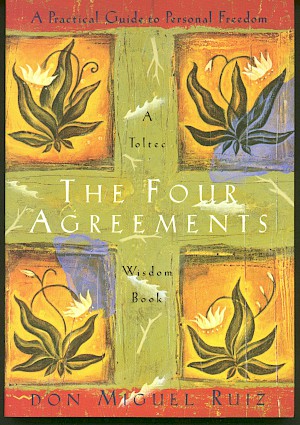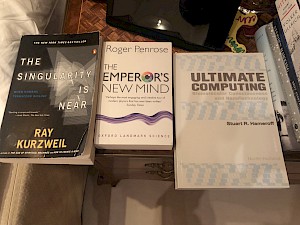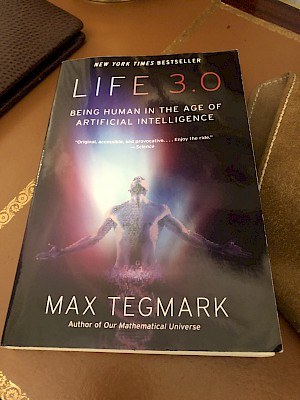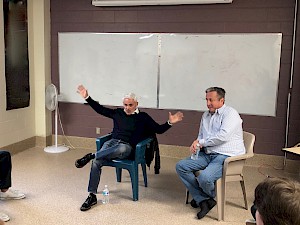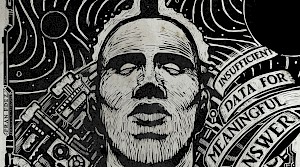Until the end of time
June 30, 2020“I believe that every true theorist is a kind of tamed metaphysicist, no matter how pure a ‘positivist’ he may fancy himself.” Albert Einstein
“From our lonely corner of the cosmos we have used creativity and imagination to shape words and images and structures and sounds to express our longings and frustrations, our confusions and revelations, our failures and triumphs.” Brian Greene
What is this?
Why are we here?
I am certain that we have all pondered these two questions at one time or another, as have countless philosophers and scientists throughout the centuries. In fact, it’s almost a certainty that these questions have dogged humanity since man first became self-aware as a species. I suspect our collective quest for answers has been driven by the one bummer that comes from being self-aware, which is knowing we are going to die and cease to exist. Man is unique in that sense. (A gnu or a raccoon doesn’t sit around thinking about death, the universe or the hereafter.)
The finality of it all is a terrifying thought. It’s the dread of eternal nothingness that has inspired mankind to seek answers and some meaning to it all. I must confess, I think about it a lot. My fascination with subjects such as physics, cosmology, artificial intelligence and consciousness are in part driven by a comforting need of sorts, for solace. Some clue that we are something more than a magnificent fluke of nature. Here and then gone. An infinitesimal blip, lost and forgotten, inside an unfathomable eternity.
“The appeal of a law of nature might be its timeless quality. But what drives us to seek the timeless, to search for qualities that may last forever? Perhaps it all comes from our singular awareness that we are anything but timeless, that our lives are anything but forever.” Brian Greene
Brian Greene’s book, “Until the end of Time”, explores these questions in a refreshing manner. I have been a Greene fan for many years. It was his book, “Fabric of the Cosmos” that started me on my own journey of discovery into the wacky world of quantum physics, which in turn, led to my interest in learning about other areas of science. Read my blog “How I Came to Love Physics, and Other Mysteries of the Universe”. When I finally met Greene a few years ago, he told me about his upcoming book and I have been waiting excitedly ever since. He recently sent me a copy which he, incidentally, forgot to inscribe.
Greene is not only a renowned physicist who has made important contributions to string theory, but he’s also an exceptional writer. He can take complex ideas which in his world of theoretical physics are usually explained with mathematical formulas and translate them in terms the average lay person can comprehend. In this book he uses personal stories, literary works and every day imagery to explain and dissect heady concepts that range from entropy to consciousness.
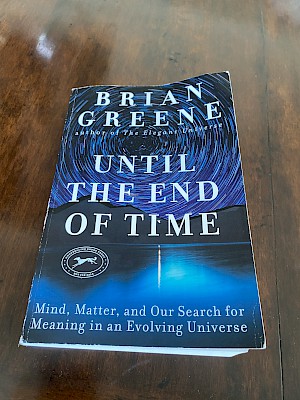 In “Until the end of Time” Greene draws on his own field of physics and other sciences, sprinkled with a touch philosophy to explore what we know about the nature of reality and where we, as humans, fit into the picture. As I read the book, I began getting the sense that Greene was going through his own existential crisis; a man looking for answers that by his own admission, he does not have. Admitting throughout the book that there are other possibilities to his own reductionist approach, he is careful to tell us often that it’s his “gut” that leads him to one conclusion or another.
In “Until the end of Time” Greene draws on his own field of physics and other sciences, sprinkled with a touch philosophy to explore what we know about the nature of reality and where we, as humans, fit into the picture. As I read the book, I began getting the sense that Greene was going through his own existential crisis; a man looking for answers that by his own admission, he does not have. Admitting throughout the book that there are other possibilities to his own reductionist approach, he is careful to tell us often that it’s his “gut” that leads him to one conclusion or another.
By injecting all the ingredients and forces that come together to make up the world (particles, entropy, molecules, cells), he eventually brings it back to us, a self-reflective species. He explores the “hard question“ of consciousness which continues to elude scientists and philosophers to this day. I wrote about this subject recently in my blog on Consciousness after reading many books on the topic. I find it fascinating that we have this voice in our heads that feels untethered from our body. It’s what makes us sentient beings, aware of our own existence with the ability to contemplate it, feel, and think in abstract.
I hope Greene forgives me for butchering his narrative, but as I don’t have the space to write a full dissertation on his logic and conclusions, I will try to summarize my take on the book in two paragraphs.
We, our reality, are products of the Big Bang, which set in motion the arrow of time (past, present and future). Greene throws in the difficult and often misunderstood concept of entropy (the second law of thermodynamics) that implies that all systems move from a highly ordered state to one of disorder. The moment before the Big Bang was highly ordered and as the universe expands it is becoming increasingly disordered and will eventually (hundreds of billions of years from now) disintegrate into oblivion. Within this overall envelope of disorder are pockets of highly ordered systems, like stars. He calls this the entropic 2-step. The various steps it took between just particles in the early universe and us becoming sentient beings, including molecules, cells and evolution are versions of this entropic 2-step. Consciousness, in his opinion, is just the product of a highly organized pattern of mindless particles.
“The mental faculties that allow us to shape and mold and innovate are the very ones that dispel the myopia that would otherwise keep us narrowly focused on the present. The ability to manipulate the environment thoughtfully provides the capacity to shift our vantage point, to hover above the timeline and contemplate what was and imagine what will be. However much we’d prefer it otherwise, to achieve “I think, therefore I am” is to run headlong into the rejoinder ‘I am, therefore I will die.’”
We don’t really possess “free will” as we imagine we do. We are just a bag of particles controlled by the laws of physics. But the exquisite arrangement of our particles gives us a wide range of ways to react to external stimulus. More than, say, a rock does. Language and story-telling may have some evolutionary survival benefits but they don’t make us special in the bigger picture. Greene postulates that the driving force behind our human achievements is the knowledge that our existence is terminal. Our mortality is the motivating factor that makes us strive to leave legacies such that we are not erased from the world. We will cease to exist as will the universe and there is not much we can do about it, except bathe and marvel in the splendour of our existence.
In his own words, “As we hurtle toward a cold and barren cosmos, we must accept that there is no grand design. Particles are not endowed with purpose. There is no final answer hovering in the depths of space awaiting discovery. Instead, certain special collections of particles can think and feel and reflect, and within these subjective worlds they can create purpose. And so, in our quest to fathom the human condition, the only direction to look is inward.” He continues, “But within that rubric, within that understanding, everything else is the human species contemplating itself, grasping what it needs to carry on, and telling a story that reverberates into the darkness, a story carved of sound and etched into silence, a story that, at its best, stirs the soul.”
My personal take on Greene’s analysis and conclusions is that although it’s hard to argue with his logic and the meticulous reductionist approach he undertakes, I can’t help but feel that his take is simply that of a brilliant mind at a moment in our history. I keep thinking of past great minds and their view of reality. Realities which were shaped by the limits of their knowledge. Sir Isaac Newton made us believe that the world operated under the strict laws of what we now refer to as classical physics. Then Albert Einstein came along. Einstein added a new dimension to our understanding of space and time that blew the lid off Newtonian physics. In the twentieth century alone we discovered quantum physics, black holes, the complex coding if life itself in DNA and a myriad of other things that had revolutionary implications to our understanding of reality and our own existence. What will we learn or discover one hundred years from now or one thousand years from now that will add to our understanding of what this is? Greene’s own string theory suggests seven additional dimensions to the four we are aware of. Does the answer lay in multiple dimensions or multiverses? The Big Bang may prove to actually be a “big bounce” (as some cosmologists suggest), meaning the universe does not end in oblivion. Consciousness may end up residing in some minute form within particles themselves and by implication, be universal. Reality may be something completely unavailable to our understanding. Perhaps we are just an incredibly advanced simulation as suggested by the “Simulation hypothesis.” (A fun subject for a future blog.) The point is, as advanced as we may think we are, we might still be primitive in our understanding of our reality.
If you are looking for consolation, as I might have been, you will not likely find it in this book. What you will find is a beautifully written exploration of humanity’s search for purpose that will help you understand and appreciate the uniqueness of our journey from the Big Bang to the magnificent beings that we are. Ones that can imagine, create, feel and of course, love.
“Whereas most life, miraculous in its own right, is tethered to the immediate, we can step outside of time. We can think about the past, we can imagine the future. We can take in the universe, we can process it, we can explore it with mind and body, with reason and emotion. From our lonely corner of the cosmos we have used creativity and imagination to shape words and images and structures and sounds to express our longings and frustrations, our confusions and revelations, our failures and triumphs. We have used ingenuity and perseverance to touch the very limits of outer and inner space, determining fundamental laws that govern how stars shine and light travels, how time elapses and space expands — laws that allow us to peer back to the briefest moment after the universe began and then shift our gaze and contemplate its end.” Brian Greene




